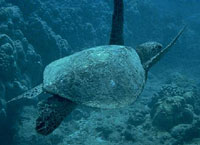They may be swimming against the current, but sea turtle advocates say they want Gov. George W. Bush (R) to show a little of his fabled compassion for the endangered reptiles that frequent the Gulf of Mexico along the Texas coast.

The New York Times ad.
Image: STRP.
As the GOP presidential hopeful prepared to accept his party’s nomination earlier this month, the San Francisco-based Sea Turtle Restoration Project (STRP) ran a full-page ad in the New York Times implicating Bush in the deaths of thousands of turtles that have washed up on Texas beaches since he took office in the state. The ad calls on the governor to support proposed shrimp fishing regulations in Texas that would have the side effect of helping turtle populations. “Will Governor Bush save the sea turtles dying on Texas beaches?” asks the ad.
Concerned over declining shrimp harvest levels during the past two decades, the Texas Parks and Wildlife Department (TPWD) has proposed the creation of a no-shrimping zone extending five nautical miles off the state’s southern coast into the Gulf of Mexico. In addition to boosting shrimp numbers, environmentalists say the plan could spell good news for sea turtles and other marine species harmed by the $60 million-per-year shrimp industry. The department has been holding hearings on its proposal and is accepting public comment until Aug. 30. (Find out how you can submit comments.) The TPWD commissioners will vote on the plan on Aug. 31, and environmentalists think a few words from Bush in support of the proposal could cinch its approval.

A net loss — sea turtle caught with shrimp.
Photo: STRP.
Says STRP campaign director Teri Shore: “The Texas Parks and Wildlife Department wants immediate action to prevent the collapse of the Texas shrimp fishery and deaths of sea turtles, but Gov. Bush remains conveniently silent, hiding behind the election.” Having gained a modicum of fame by dressing in sea-turtle costumes and accosting officials at last year’s World Trade Organization protests in Seattle, Shore and her cohorts hope that public pressure can not only lead to the no-fishing zone but also galvanize a tentative proposal to create a larger marine reserve to protect turtles.
Jumbo Shrimp Problems
Last year was one of the worst years on record for sea turtle strandings, says STRP. A near-record 450 turtles washed up dead or dying on Texas beaches in 1999, according to the Sea Turtle Stranding Network, a volunteer monitoring group; federal officials confirm these numbers. Of these, nearly 100 were Kemp’s ridley turtles, a species listed as endangered. Many people believe these deaths can be attributed to turtles getting tangled up in shrimping equipment.

Tangled up in blue.
Photo: NMFS.
For their part, though, Texas officials claim the turtle population is doing pretty well. According to Robin Riechers, the director of coastal fisheries management for TPWD, proposals to limit shrimping could have beneficial side effects for sea turtles, but those creatures are not the main concern. Decisions concerning restrictions on the shrimp industry are primarily intended to provide a safety net for the fishery, says Riechers, though he acknowledges that nearly half the aquatic animals caught by shrimp boats are non-target species. “We want to reverse the current trends,” he says, “and lessen the fishing pressure on the shrimp both offshore and in the bays. But we’ve got to balance a lot of different priorities; we have a lot of different stakeholders even within the shrimp industry itself.”
Shore claims that the TPWD has been reduced to such mealymouthed explanations because Bush has failed to take an aggressive stand on protecting natural resources — and Texas environmentalists doubt the governor will change his song anytime soon. Brian Sybert, natural resources director with the Lone Star Chapter of the Sierra Club, has been lobbying to rein in the shrimp industry for months but doesn’t hold out a lot of hope for aggressive reform from the TPWD commission. “Implementing regulations is a real challenge for some of these commissioners,” says Sybert. “They’re Bush appointees, of course, so they don’t want to interfere with anybody’s business.”

Life’s not a beach for sea turtles.
Photo: USFWS.
Through the spring and summer at public meetings in south Texas, the shrimp industry has been vocal with regard to proposed rule changes. Fishers oppose not just the controversial no-shrimp zone along South Padre Island where turtles nest, but also any shortening of the shrimp season or changes in equipment that might reduce the amount of non-target species taken in shrimp nets. Industry representatives say the government should look for other culprits in declining shrimp harvests, such as pollution, and they trot out the tried-and-true cry that jobs will be lost if the state sees fit to further regulate the industry.
The Texas Shrimp Association even threatened to sue the Sierra Club for libel if it didn’t back down from claims that the industry was to blame for turtle deaths. The Sierra Club refused; nothing happened. “It’s the same old rhetoric,” says Sybert.

The lone turtle of Texas?
Photo: USFWS.
Still, he believes that some good could come out of the new shrimp plan. “We’ve got the support of all the environmental groups, and we’ve even got TPWD out on a limb. They’ve got the science to back it up. People have been monitoring this for 20 years, and we know it’s during the shrimp season when the most turtles wash up on the beaches.”
Sybert also notes that the green groups have found an additional ally that might just force TPWD to take their concerns a little more seriously. This spring an alliance of sport anglers added their voices to those in favor of stronger shrimp regulations, providing turtle advocates with a teammate that’s worth approximately $2 billion to the Texas economy — and also one to which Bush, an avowed angler himself, might actually listen.


